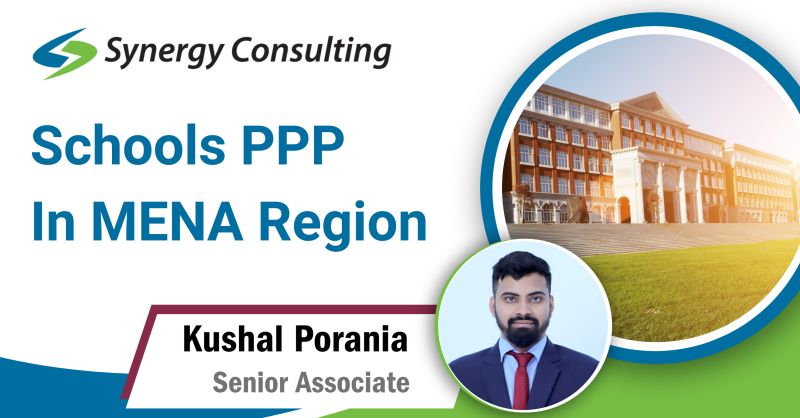Kushal Porania, Senior Associate at شركة سينرجي للاستشارات shares insights on “Schools PPP in MENA Region”.
MENA’s population will grow to over 840 million by 2050, out of which 40% are under the age of 24, driving the demand for educational facilities in the region. Educational facilities include various dimensions, such as physical infrastructure, quality of education, and equitable access.
The current expenditure on education, as a percentage of GDP in the MENA region, ranges from 4 to 6%. It is important that private and public sectors engage and innovate collaboratively to meet demand in key areas such as improving school structures, providing social progress, and streamlining pedagogical operations while ensuring the quality of education is not hampered.
Considering the lengthy project pipeline in the geography, in order to tap into additional liquidity offered by private sector participants, it is in the government’s interest to leverage public-private partnerships (PPPs) for education, allowing the government and relevant ministries to focus on the core educational operations.
In the education sector, private sector participants are typically accountable for performing construction, procuring financing, operating, maintaining, and handing the assets back at the end of the concession period. Core educational operations lie with the public entity. The private partner is entitled to receive availability-based payments to provide the infrastructure and perform the facility management operations. Concession agreements range from 20-30 years, allowing private partners to take advantage of long-term debt. Demand-related risks are borne by the public partner, whilst construction and operations risks are transferred to the private partner.
Multiple education PPP projects have been tendered; some have achieved financial closure and are under construction or in operation. The Zayed City Schools PPP is currently under construction and being delivered by a consortium led by BESIX and Plenary Group. This project, tendered by the Abu Dhabi Investment Office in collaboration with Abu Dhabi Department of Education and Knowledge, includes the design, build, finance, maintenance, and transfer of 3 new school campuses for 5,360 students.
Tatweer Buildings Company (TBC) is spearheading the Saudi Arabia Schools Infrastructure Development Programme as part of the Vision 2030 initiative, designed to enhance the quality of school buildings through PPPs, including financing, designing, construction, and maintenance of 60 public schools in Makkah and Jeddah, accommodating over 50,000 students.
In Oman, the Ministries of Finance (MOF) and Education (MOE) tendered a first-of-its-kind school PPP project, which includes the development, construction, and operations of 42 schools. TBC is planning similar projects in Egypt and Jordan.
Governments in the region are committed to achieving their strategic objectives via PPPs to meet the demand for education.
